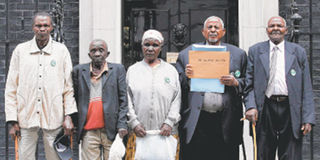UK lawyers praise Mau Mau ruling

(Left to right) Kenyans Ndiku Mutwiwa Mutua, Paulo Muoka Nzili, Jane Muthoni Mara, Gitu wa Kahengeri and Wambugu wa Nyingi in a picture taken in London in June 24, 2009.
What you need to know:
- The issue attracted widespread coverage in the international media on Saturday, with a Guardian newspaper editorial saying that the ruling was “historic for a number of reasons.
- It is the first time Britain has conceded that torture took place in any of its colonies.
- The first time a victim of such abuse has sought redress against the British Government in the British courts.
The British Government could face thousands of claims from former Mau Mau detainees under colonial rule following the historic ruling of the High Court in London that there is a case to answer.
According to the London-based legal team of Leigh Day and Company, who have acted on behalf of three Kenyans — Jane Muthoni Mara, Wambuga Wa Nyingi and Paulo Muoka Nzili — “the judgment means the (UK) government will now have to face potentially thousands of claims from Kenyans who suffered similar torture.”
In a statement put out following the ruling by Mr Justice McCombe, Leigh Day and Company said that the British Government now faced a choice — to “face a full trial or seek settlement with those it accepts were tortured by the British colony.”
However, the British Government has said it intends to appeal against the ruling. A spokesman for the Foreign and Commonwealth Office in London said the judgment had “potentially significant and far-reaching legal implications”.
The issue attracted widespread coverage in the international media on Saturday, with a Guardian newspaper editorial saying that the ruling was “historic for a number of reasons.
It is the first time Britain has conceded that torture took place in any of its colonies. (READ: Mau mau veterans win torture case against Britain)
The first time a victim of such abuse has sought redress against the British Government in the British courts.
And the first time Kenyans have been able to articulate on an international stage the true story of the Kenya emergency.
“This judgment will undoubtedly reverberate around the world, and the British Government’s unwillingness to deal with the victims with dignity is now a matter of international media attention.”
The British Government has already conceded that there is validity in the case with a spokesman saying that London did not dispute that the claimants were tortured by colonial forces.
Pain and grievance
“We have always said that we understand the pain and grievance felt by those, on all sides, who were involved in the divisive and bloody events of the emergency period in Kenya, and it is right that those who feel they have a case are free to take it to the courts,” he said.
However, he also pointed out that “the normal time limit for bringing a civil action is three to six years.
In this case, that period has been extended to over 50 years despite the fact that the key decision-makers are dead and unable to give their account of what happened,” the spokesman said.
“Since this is an important legal issue, we have taken the decision to appeal. In light of the legal proceedings it would not be appropriate for the government to comment any further on the detail of the case.”
However, Justice McCombe ruled that “… a fair trial on this part of the case does remain possible and that the evidence on both sides remains significantly cogent for the court to complete its task satisfactorily”.
The ruling means that, in effect, the High Court rejected the British Government’s attempt to strike out the claims of three Kenyan victims of British colonial torture on the grounds that the claims were time-barred.
Martyn Day, Senior Partner at Leigh Day & Co, said that the ruling was “an historic judgment which will reverberate around the world and will have repercussions for years to come ... There will undoubtedly be victims of colonial torture from Malaya to Yemen from Cyprus to Palestine who will be reading this judgment with great care.”




